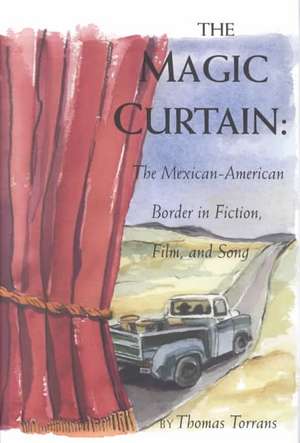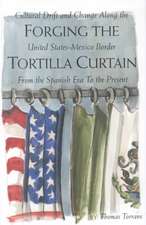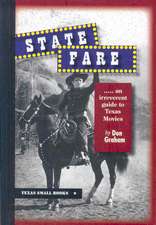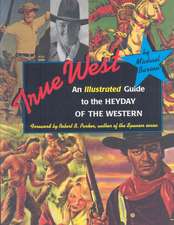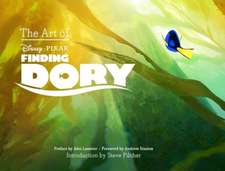The Magic Curtain: The Mexican-American Border in Fiction, Film, and Song
Autor Thomas Torransen Limba Engleză Hardback – 31 mar 2002
True border novels form a literature that deserves a category all its own. There is an uneven quality--a coarseness sometimes mixed with polish, running the gamut of emotion from the tragic to the comic.
One recent fictional attempt to exploit the border's historical aspects is "Fandango" by Ron McCoy (1984), while one of the older efforts is that of the early twentieth-century novelist Will Levington Comfort in "Somewhere South in Sonora" (1925). Border fiction is often just part of a larger whole and a number of books, whether fiction or nonfiction, seldom if ever cross the magical line between the two cultures. They remain, for the most part, fully centered in either Mexico or the United States, such as J. Frank Dobie's very Texan "A Vaquero of the Brush Country" or his personalized account of his equestrian travels in northern Mexico, first published as "Tongues of the Monte" and later as "The Mexico I Like."
Film epitomizes the escape across the magic curtain. "The Getaway" (based on the novel by Jim Thompson) is exemplary. Carol and Doc (Ali McGraw and Steve McQueen) not only manage the great escape with a satchel full of stolen money, they do it by fleeing to the border after a long brush with death. Filmmakers have carved movies out of other novels. B. Traven's "The Treasure of the Sierra Madre" and Glendon Swarthout's "They Came to ""Cordura" are compelling looks at the vast and hard country that the border stitches together.
Fortunately, "corridos"--the voice of the people--are not dead. They exist far afield, from the ballads created around the life and work of California's Cesar Chavez and the United Farm Workers of America movement to the older songs. Numerous ballads celebrate incidents befalling those running afoul of the law--from bandits to smugglers, large landholders, Texas Rangers, and, inevitably, cattle dealers and rustlers. Still others recount the derring-do of such once well-known figures as Juan Cortina (the "Red Robber of the Rio Grande") and Catarino Garza, dreamers of lost causes and proponents of independent border republics. "Corridos" also faithfully reflect the latest developments--technology and "maquiladoras," for example.
Preț: 163.81 lei
Nou
Puncte Express: 246
Preț estimativ în valută:
31.35€ • 32.56$ • 26.04£
31.35€ • 32.56$ • 26.04£
Carte disponibilă
Livrare economică 13-27 ianuarie 25
Preluare comenzi: 021 569.72.76
Specificații
ISBN-13: 9780875652573
ISBN-10: 0875652573
Pagini: 235
Dimensiuni: 164 x 237 x 25 mm
Greutate: 0.55 kg
Editura: Texas Christian University Press
ISBN-10: 0875652573
Pagini: 235
Dimensiuni: 164 x 237 x 25 mm
Greutate: 0.55 kg
Editura: Texas Christian University Press
